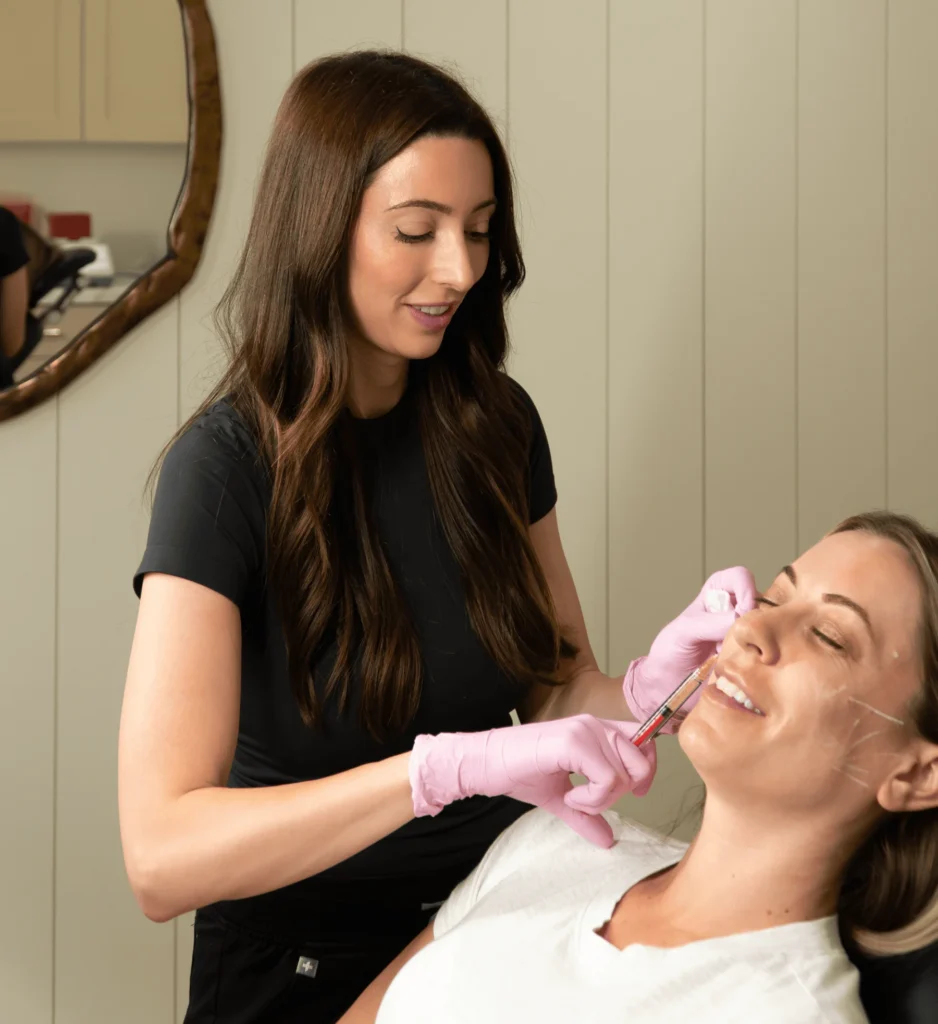When it comes to skin rejuvenation, both laser resurfacing and chemical peels are popular choices. They each have their strengths and are effective for different skin concerns.
Deciding which treatment is better depends on various factors such as your skin type and concerns, budget, and preferred downtime.
Let’s unpack key points when considering which treatment may be better for you.
Should You Get a Chemical Peel or Laser Resurfacing?
Laser resurfacing and chemical peels are great treatments, but they work differently and suit different skin concerns.
Laser Resurfacing
This treatment uses concentrated light energy to remove outer skin layers and stimulate collagen production. It’s highly effective for treating sun damage and pigmentation as well as deeper skin issues like severe acne scars and wrinkles.
One of the most advanced forms of laser resurfacing is CoolPeel, which offers minimal downtime and precise treatment.
Chemical Peels
A chemical peel involves applying a chemical solution to the skin, which prompts the skin to exfoliate and ultimately peel off.
Chemical peels can vary in strength — light peels can address minor issues, and deep peels can tackle significant skin concerns. They are ideal for improving skin texture, tone, and overall radiance.
How To Know Which One to Choose?
Choosing between laser resurfacing and a chemical peel depends on your cosmetic goals.
Skin Concerns
Laser resurfacing might be the better option for those with deeper skin issues, such as significant acne scarring, deep wrinkles, or persistent hyperpigmentation.
A chemical peel can be highly effective for more superficial concerns, such as minor texture issues, fine lines, or uneven skin tone. Chemical peels are often more appropriate for melasma.
Skin Type
Those with darker skin tones might need to be cautious with laser treatments due to the risk of hyperpigmentation. Chemical peels can be customized to different goals and types of skin, making them a versatile option.
Downtime
Laser resurfacing, a more intensive treatment, can require a slightly more extended recovery period. CoolPeel, however, offers minimal downtime of a few days.
Chemical peels also vary in downtime depending on their strength, with light peels having virtually no downtime and deep peels requiring up to two weeks of recovery. We offer many peels that are considered “no peel” peels and you will peel very minimally.
Should You Do a Chemical Peel Before or After Laser Treatment?
It’s generally only recommended to combine these treatments with close professional guidance. Both treatments exfoliate and renew the skin, so doing them too close together can lead to excessive irritation and damage.
Before Laser Treatment
If you’re considering a chemical peel before laser resurfacing, a light peel should be done several weeks in advance to allow your skin to recover fully.
After Laser Treatment
Similarly, it would help if you waited several weeks after laser resurfacing before considering a chemical peel to avoid over-exfoliating the skin.
Always check with a skincare professional to determine the best treatment schedule for your skin.
Pros and Cons of Each Treatment
Laser Resurfacing
Pros
Effective for Deep Issues: Excellent for severe acne scars, deep wrinkles, and significant hyperpigmentation.
Stimulates Collagen Production: Promotes long-term skin health and rejuvenation.
Less treatments: Results can be achieved with fewer treatments than chemical peels.
Cons
Cost: More of an investment, with a single CoolPeel treatment here at Curated Medical costing $700 and a package of three for $1,785.
Downtime: Even minimal downtime treatments like CoolPeel require a few days of recovery; deeper treatments require longer.
Side Effects: Potential for redness, swelling, and temporary pigmentation changes. However, most side effects are generally mild and typically resolve within a few days to a week.
Chemical Peels
Pros
Versatile: Can be customized to various skin concerns and types.
Cost-Effective: Generally more affordable than laser treatments, BioRePeel is available for $275 per treatment, and Noon peels are $225 and include a facial.
Minimal Downtime Options: Light peels can be done with no downtime.
Cons
Effectiveness Varies: Light peels might be less effective for deeper skin issues.
Multiple Treatments Needed: Often requires a series of treatments for best results.
Side Effects: Potential for redness, peeling, and sensitivity post-treatment. It is always recommended to follow post-treatment care instructions provided by your skincare professional to help minimize these effects.
How Effective is Each Treatment?
Both treatments are highly effective when used appropriately.
Laser Resurfacing Effectiveness
Laser provides significant improvements in skin texture, tone, and clarity, especially for deeper issues. Results can be seen after a single treatment, though several sessions might be needed for maximum results.
Chemical Peel Effectiveness
Chemical peels improve skin radiance, texture, and minor pigmentation issues. Light peels offer a subtle glow, while medium and deep peels can address more pronounced skin concerns. A series of treatments often yields the best results.
Choose Your Best Treatment at Curated Medical
Deciding between laser resurfacing and chemical peels depends on your skin needs, budget, and unique situation.
At Curated Medical, we can help you choose the best treatment for your individual needs in a compassionate and welcoming environment. If you’re in the Scottsdale, Arizona, area, contact us today to book a consultation.



